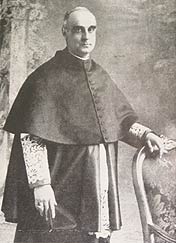
A manly figure, whose strength is replete with harmony and proportion and whose bodily vigor seems penetrated by and imbued with the strong and luminous presence of a great soul. His facial features are very defined and also well proportioned.
Handsome? Without a doubt. But there is almost no time to analyze his physical beauty because his profound gaze — at once serious, serene, pensive, grave and gentle — so captivates the attention that one hardly notices anything else.
It is the gaze of a thinker and a man of action — a thinker who sees things from the highest summits of philosophy and theology, yet a man of action whose sights are well fixed in reality, who can see deeply into people, things and events. There is a note of melancholy in the gaze, one of firmness and energy in the lips, and a noble, lofty attitude in his whole being. The hands seem made to command.
Everything about this extraordinary man shows us a fighter who has no illusions about the world, who takes a definite stand in face of it, and who is ready for all the battles that life presents. All this is seemingly illuminated by a subtlety of expression and an aristocratic affability that allows us to glimpse the noble and diplomatic character of this man.
 Learn All About the Prophecies of Our Lady of Good Success About Our Times
Learn All About the Prophecies of Our Lady of Good Success About Our Times
Such was the rich personality of he who in this life was called Rafael Cardinal Merry del Val, titular Archbishop of Nicea, who went down in history as the Secretary of State of Saint Pius X.
Descended from an aristocratic line, he was the son of Marquess Merry del Val and the Countess of Zulueta, and in his veins ran illustrious blood from various countries of Europe: Spain, England and Holland. He consecrated himself to the service of the Church, taking Holy Orders and receiving the fullness of the priesthood. In this, he lost nothing of his natural talents. Rather, he elevated them, for the special quality of grace is not to destroy nature, but to elevate and sanctify it. His profound wisdom sprouted from an ardent faith and an admirable piety. His strength was an expression of a supernatural temperance. His dignity was the fruit of a keen consciousness of the respect that he owed himself for so many natural, and principally supernatural, reasons.
In an epoch where the winds of baseness sweep over everything and even try to drag the priesthood into mediocrity — extolling a disparaged, demotic and secularized clergy to the taste of the reigning demagogy — the noble figure of Cardinal Merry del Val presents an admirable model of supernatural dignity that well illustrates the ineffable dignity of the priest in the Church of God. That dignity can shine not only in a prelate like Rafael Merry del Val, but also in the most modest town vicar.
Christian pride is not the opposite of humility, but rather its harmonious complement.
The Secretary of State of Saint Pius X was a profoundly humble soul, and from him came one of the most beautiful writings on Christian humility.
In this section, where we usually compare two contrasting pictures, today we compare a photograph with a prayer.
Our readers will thus see how a most elevated dignity coexists with a most profound humility in a genuine, supernaturally Catholic heart, in imitation of that Sacred Heart that the Church tells us is at the same time meek, humble and infinitely majestic.
* * *
LITANY OF HUMILITY
O Jesus, meek and humble of heart, hear me.
From the desire of being esteemed, * deliver me, Jesus.
From the desire of being loved, *
From the desire of being extolled, *
From the desire of being honored, *
From the desire of being praised, *
From the desire of being preferred, *
From the desire of being consulted, *
From the desire of being approved, *
From the fear of being humiliated, * deliver me, Jesus.
From the fear of being despised, *
From the fear of suffering rebukes, *
From the fear of being calumniated, *
From the fear of being forgotten, *
From the fear of being ridiculed, *
From the fear of being wronged, *
From the fear of being suspected, *
That others may be more loved that I, ** Jesus, grant me the grace to desire it.
That others may be esteemed more than I, **
That in the opinion of the world others may increase and I may decrease, **
That others may be chosen and I set aside, **
That others may be praised and I unnoticed, **
That others may be preferred to me in everything, **
That others may become holier than I, provided that I may become as holy as I should,
Jesus, grant me the grace to desire it.
Read Also:
Humility, Magnanimity and Magnificence
Balance and Harmony Between Riches and Poverty
Humility Is Compatible with the Rich Dress of One’s Office
